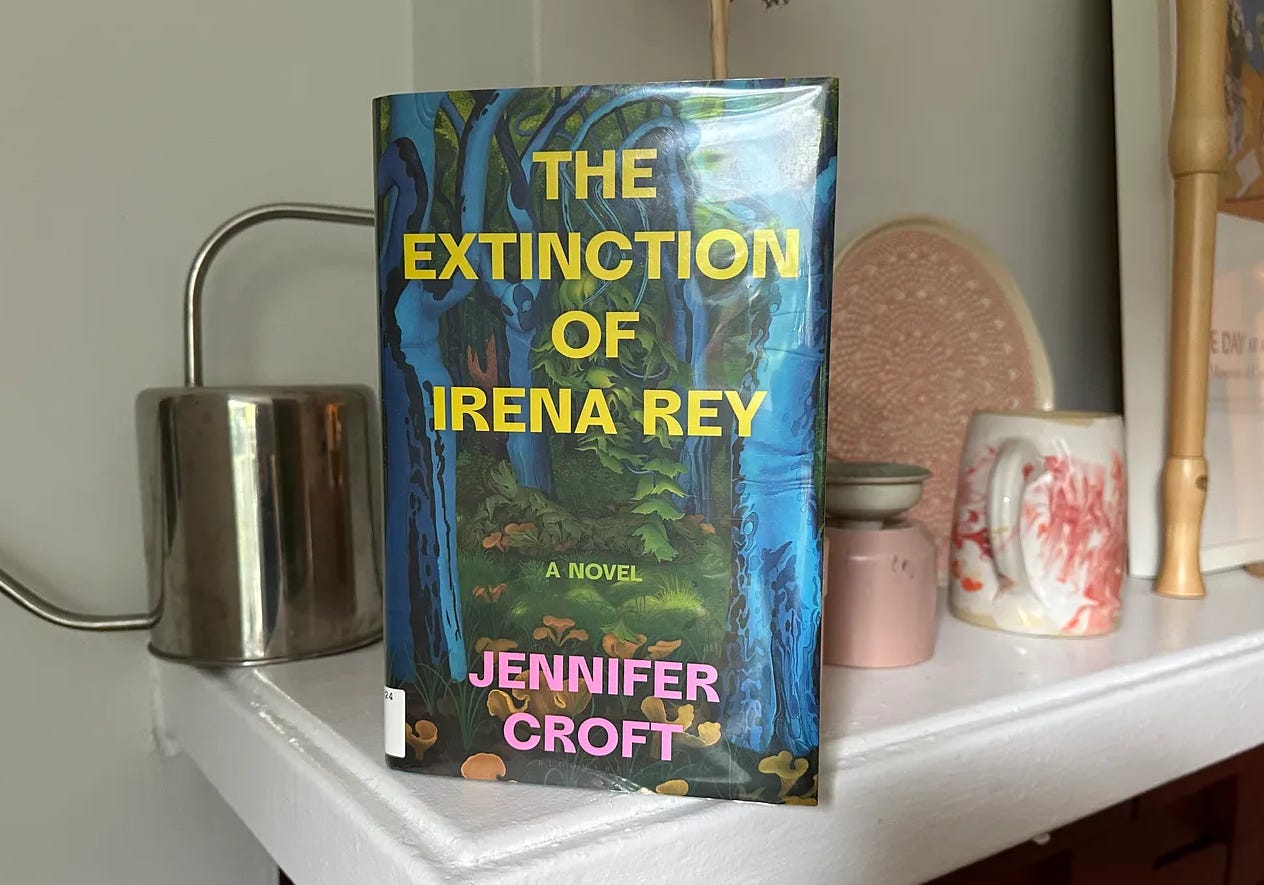Translation & The High Gloss Void
The Extinction of Irena Rey by way of Biography of X; The mysterious appeal of Love Island
In this newsletter, I’m writing about two recent, wildly unrelated pieces of media. On one hand, they have nothing to do with one another. On the other, I’m obsessed with them both, so: why?
First: The Extinction of Irena Rey by Jennifer Croft
If you liked, or at least were intrigued by Biography of X by Catherine Lacey, you should read The Extinction of Irena Rey by Jennifer Croft.
They’re both ambitious novels about an obsession with a female artist, who exists in both books as an all-consuming force that haunts but is rarely present in the actual pages of the story. Each novel creates its own interior worlds. Biography of X with its sprawling, speculative American history that rewrites the entire 20th century. Irena Rey does not nearly have as wide a lens. The novel’s interior world is insular to the point of claustrophobia: it is presented as the English translation of a novel written in Polish by a Spanish translator. Both English and Spanish translators are major characters in the story of a group of translators and their relationship with their beloved Nobel prize-winning author, Irena Rey.
The English and Spanish translators as well as Irena Rey herself are all fictional. Jennifer Croft, on the other hand, is most famous for her real translations of the real Nobel prize-winning author, Olga Tokarczuk. Like Irena Rey, Tokarczuk writes long, sprawling books about climate change, forests, and reference densely researched history. That said, Irena Rey is not about Tokarczuk.
It is instead about translation writ large. It simultaneously presents two competing schools of thought about the moralities and obligations of translation. It is a lush, strange, and increasingly surreal book. Like Biography of X, it slowly destabilizes its own reality the farther you fall into it.
It is also a mystery, which certainly helps move the plot of a novel that is otherwise mostly just a translator’s bacchanal forward. It is not a thriller — answering the mystery is just a piece of a larger puzzle. Going into it with that expectation is a setup for disappointment. There are answers, but so much more is a question of translation, transformation, and the ambiguity of meaning between people and languages.
The novel’s great trick is that it dramatizes the act of translation. There is the truth, the events of seven weeks; the retelling of those weeks as presented in Croft’s novel; and various truths we are forced to surmise via fleeting detail. Discussing “what actually happened” in an intentionally ambiguous book feels like an unfruitful exercise, the equivalent of trying to guess how many jelly beans are in a jar in a contest with no prizes. Maybe there’s an answer: but who cares? In the case of Irena Rey, the question of what actually happened off-page, on-page, and in-between feels essential, and essentially unknowable. I would love to discuss it with anyone who journeys into the forest!
For a moment, he stared back. A ladybug landed on my arm, which was good luck, I thought, but probably not good enough to get me out of this nightmare where either everything was connected to everything else by means of a word or everything was everything else, and the word was just the sequela of that staggering collapse.
If you’re interested in translation as a narrative subject: A Ghost in the Throat by Doireann Ní Ghríofa, a cobbled together autofiction, poetic series of essays & ephemera about a 21st century mother’s obsession with, and translation of, an 18th century lament poem.

And now: Love Island UK
It is impossible to talk about Love Island UK without starting with the most important fact: it is on six nights a week. For most people, this is the immediate out. It is an astonishing amount of content in which almost nothing at all happens. Hours are spent arguing about the implications of elaborate games of truth or dare created by unseen producers.
I am not going to defend it as high art, especially after spending 300+ words trying to recommend a serious (although funny!) work of literary fiction above. Instead, here are the reasons why it is captivating to me, personally:
The Aesthetics: The show features a dozen or so adults, hairless from the eyebrows down, on glossy laminate furniture in white, pink, teal or yellow. Every once in a while we see an angle of the villa (our well-oiled adults’ enclosure) revealing it to be a traditional Spanish stone building. Shiny waterfall counters, neon phrases in early 00s cursive fonts, a shared 12 person bedroom, are constructed over and around it.
The Consequences: One of the central dramas of the show, season after season, is that someone does something unkind to another person (romantically or platonically) and then is forced to quite literally live with it. In the real world, the person you hurt doesn’t sleep in the same room with you. It is genuinely fascinating to watch people confront the consequences of their actions in ways they may never have done before.
The Accents: Someone once said that shows like Downton Abbey are what Britain imagines itself as, but Love Island is what Britain really is. It is a profound joy to hear a wide array of accents from all over. Nothing is a monolith.
The Performance: Nothing is as Gender as Love Island. Lad’s holiday, girl’s girl, the performance and ongoing production of gender is so loud and central to every moment.
As a lifelong student of the human condition (read: a busybody), Love Island is a powerful hypnosis. Episodes flow like water, with contestants arriving, leaving, and attempting to get brand deals. Meanwhile: the translators in Irena Rey work diligently to translate a 900-page magnum opus, and all the time they are increasingly mired in petty jealousy, professional envy, and lust. We know from the opening pages that they are translating an author who will eventually win a Nobel prize. The aesthetics of this world could not be more different than Love Island.
And yet, even as they (and we) consider essential questions about the place of art in a planet in collapse — they’re still metaphorically looking over their neighbour’s fence to see what they have, trapped with the same petty human impulses as the high-gloss, low-impact world of Love Island.
In almost every way, it is hilarious to compare these two things. There’s the simple fact that they are both things I read or watched in the last month. At the end of the day, we love mess: whether indulgently told in a 300-page novel, or argued about on screen.



i woke up this morning thinking about biography of x, as i have since the day i finished it’s final page. as a uk born + continuing dweller, this is a touching elegy. thank you for your time + the words weaved in it !
Biography of X is one of my most favorite books of recent years. I am at work on a novel and reading Lacey's book felt super liberating... I have the Irena Ray book on my TBR pile and after reading your note about it, I am defining moving it up! Thanks so much!!!
If you enjoy books about translation, I highly recommend Intimacies by Katie Kitamura.